
The most lively thing in the field of AI recently is the debate between Yann LeCun and Marcus on the development direction of AI. This debate started in August, and the aftermath has not subsided yet.
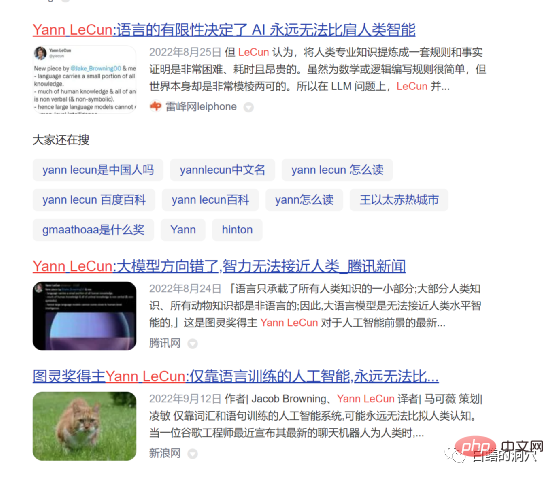
If you search domestic self-media and Baidu, you can find a lot of popular science articles that look a bit scary. Generally speaking, Yang Likun believes that the general direction of artificial intelligence technology is wrong and may need to be pushed back. Some people who are not familiar with Yann LeCun may think that what a person who looks like a Chinese person said could cause such a big stir in the AI field? Yann LeCun has a Chinese name - Yang Likun, but he is a Frenchman.
I don’t like to eat such melons directly. Domestic self-media often quotes them out of context and misinterprets the remarks of some masters to gain attention. So I went to Google and Twitter to carefully look at the debate between Yang Likun and Marcus, as well as related reporting materials. I found that these domestic views all come from an article by Tiernan Ray, a senior writer on ZDNET. Tiernan Ray has been engaged in technology and business research for 28 years and is well-known in the technology venture capital circle. His articles are still very influential. The title of Ray's article is scary enough - most of today's AI methods will not lead to true intelligence. This sentence actually came from the mouth of the great god Yann LeCun.
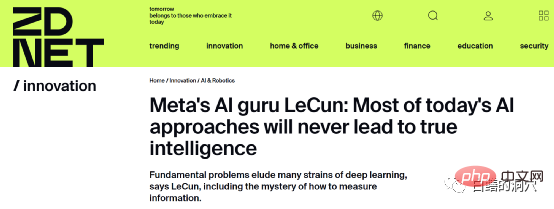
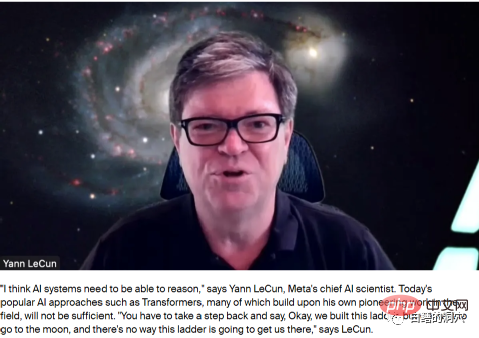
In a discussion with ZDNet via Zoom this month, LeCun made it clear that he was skeptical of many of the most successful researchers in deep learning today. Research approaches with skepticism. "I think they are necessary, but not enough." In fact, LeCun clearly expressed his view. He believed that algorithms based on statistics cannot achieve true artificial intelligence. As a media, ZDNET definitely hopes to have more exciting ones. Perspective "You have to step back and say, okay, we built one. But our goal is to go to the moon, there's no way this ladder will get us there, we need to build a rocket, and I can't tell you the details of how we build a rocket , but here are the basic principles.". For the complete content of the interview, please refer to the article on the ZDNET official website (https://www.zdnet.com/article/metas-ai-guru-lecun-most-of-todays-ai-approaches-will-never-lead-to-true -intelligence/).
If you search for LeCun on Baidu, you can see many Chinese articles discussing this matter. Judging from LeCun's statements reproduced in these articles, it seems that LeCun believes that deep learning algorithms based on statistics cannot solve the ultimate problem of AI, and that we must step back and reconsider. Because LeCun raised some doubts about how to "measure information" in AI applications. He even mentioned in an interview with ZDNET that he wanted to add symbolic reasoning capabilities to neural networks, but he still doesn't know how to implement it.
Actually, this involves the Moravec Paradox I mentioned a while ago. Neural networks and sufficient training can obtain the AI we need. This is what most people working on AI these years There was a consensus among those working on it, but LeCun raised some doubts about it, saying that neural networks were not enough. LeCun was very dismissive of Marcus's views. He even thought that Marcus was not a real person engaged in AI, but a psychology scholar who did not understand AI.
This interview has had a huge impact in the field of AI. Even LeCun, who claims to be a Bayesian, believes that the current AI exploration route is wrong, and he should give up building ladders and build rockets instead. So do we also have to think about tearing everything down and starting over? This is not the case. On Twitter, LeCun recently posted several tweets, repeatedly reaffirming that he does not completely deny the methods of neural networks and statistics. Instead, he believes that deep learning is the basis of AI technology. There is no problem.
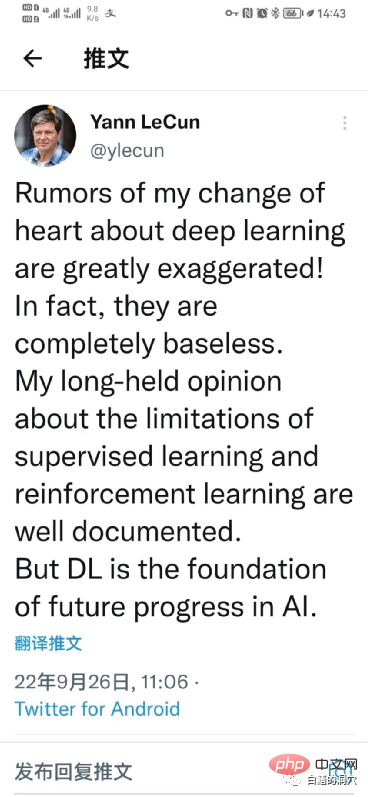
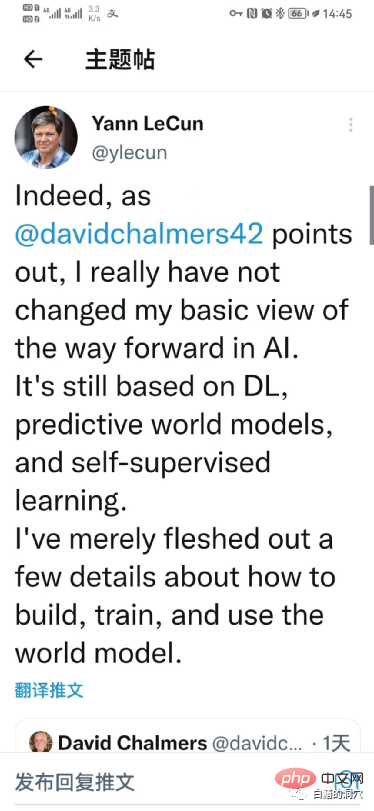
In another tweet, LeCun used "a difficult week for artificial intelligence" to express his painful thoughts. Maybe in the ZDNET interview, he did express some pessimism. We are even thinking about whether deep learning can achieve real AI. It can be seen from some of LeCun's recent statements that he has indeed been rethinking the technical direction of AI recently. However, after a week of thinking, he believes that the current general direction based on deep learning is correct, but needs to be revised. Completely subversive. This also gave a blow to some self-media that have been hyping this topic recently. It seemed that the melon suddenly changed in taste as I ate it. AI technology does not need to go back to the starting point and start over. This is not a good thing for self-media, but for AI practitioners, it is not too bad. Some other technologies need to be added to the current deep learning technology to achieve AI breakthroughs. There is no doubt about this.
In the field of intelligent operation and maintenance, these debates can also bring us some inspiration. In the field of complex intelligent operation and maintenance, deep learning algorithms have achieved great success and have given us hope of replacing experts with AI. But all this is not enough, because there seems to be a mountain that is difficult to climb on the way forward. Just like LeCun needs to introduce symbolic reasoning capabilities to neural networks, the field of intelligent operation and maintenance also needs the combination of deep learning and symbolic reasoning to be more effective.
Any idea that algorithms based on statistics can solve all problems, or that true automated operation and maintenance can be achieved based on expert experience, is wrong. How to make full use of the advantages of the two, build a functional combination, and use cocktail therapy may be the right direction for intelligent operation and maintenance in complex scenarios. At present, we are also trying not to rely entirely on knowledge graphs, but to increase the scope of intelligent algorithms in the entire automated early warning and diagnostic tools, so as to break through the current bottleneck and better solve problems for users.
I was testing D-SMART with a customer a while ago. He felt that the current D-SMART was not practical enough. Although intelligent diagnosis can tell the operation and maintenance personnel what the approximate scope of a certain problem is. , but cannot pinpoint the specific problem. In order to accurately locate, you must click one by one on the diagnostic paths recommended by intelligent diagnosis or the diagnostic suggestions provided by the expert knowledge base, which is a bit troublesome, and sometimes the accuracy of problem location is not high enough.
Indeed, this is the biggest problem we have encountered so far. At present, D-SMART’s analysis support for some simple problems is pretty good, and the conclusions of intelligent diagnosis are enough for operation and maintenance personnel to understand. If you encounter some complex problems, you can still only provide directional guidance for operation and maintenance personnel, and drill down according to the recommended diagnosis path.
If the user is a very senior expert, it will be easier to get suggestions and quickly help the expert locate the problem. If the user has insufficient abilities or is unfamiliar with a certain problem, he may still feel at a loss. In this case, we usually recommend the user to do a "problem analysis" and send me the report, or export the monitoring data on the day when the problem occurred through the Holadata tool and send it to us, and we will remotely assist in the analysis.
The current AIOPS is far from reaching the stage where the database can truly be separated from experts and achieve autonomy, so building an ecosystem of people and tools is the key. Tools are not omnipotent. The powerful data processing capabilities provided by tools can improve the analysis efficiency of experts. Only by using the interaction between first-line and third-line experts can we truly do a good job in operation and maintenance. And practitioners engaged in AIOPS work, can they also get some inspiration from Yang Likun’s reflections?
The above is the detailed content of Let's start with the debate between Yann LeCun and Marcus. For more information, please follow other related articles on the PHP Chinese website!
 Application of artificial intelligence in life
Application of artificial intelligence in life
 What is the basic concept of artificial intelligence
What is the basic concept of artificial intelligence
 Introduction to article tag attributes
Introduction to article tag attributes
 How to generate random numbers in js
How to generate random numbers in js
 Baidu keyword optimization software
Baidu keyword optimization software
 ppt insert page number
ppt insert page number
 How to implement jsp paging function
How to implement jsp paging function
 Why does the printer not print?
Why does the printer not print?




